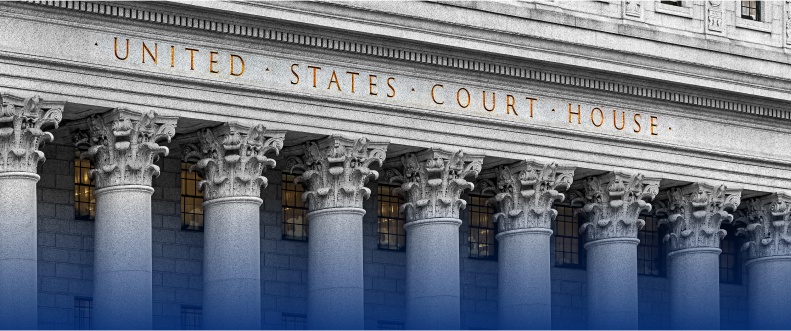
If you have been accused of a federal crime, don’t panic. An arrest does not automatically mean that you’ll be convicted. But it is vital to take immediate action to protect yourself from these allegations.
Federal government agencies like the FBI typically investigate and build cases for major crime charges. These federal agencies have extensive resources at their disposal. So you need a seasoned New Jersey federal crime attorney who has the experience and skill to take on the U.S. government. At Keith Oliver Criminal Law, federal crimes are one of our primary areas of focus. We stand ready to fight for your best interests immediately ─ even in the investigation stage before an arrest.
Contact us today for a free case review. We handle federal crimes cases throughout New Jersey, specifically in Monmouth, Mercer, and Somerset counties.
Most Common Federal Crime Cases We Handle
Federal government agencies are tasked with investigating a wide range of crimes, including:
- Federal drug charges, such as drug trafficking — The federal government is responsible for investigating crimes across multiple states. If you’re accused of trafficking or distributing drugs across state borders, you could face federal drug charges.
- Federal gun charges — Certain kinds of weapons charges fall under the federal government’s purview. These include illegally possessing a firearm, illegally transporting firearms or ammo, using a gun while committing a crime, and possessing guns or explosives at a federal facility or a school.
- Human trafficking — Federal agencies investigate human trafficking cases that span multiple states.
- Child pornography — Possessing child pornography is often a federal offense because the pornographic material may have been created in a state other than where someone viewed it. Selling or buying children to produce pornographic materials is also a federal crime.
- Bank robbery — Bank robbery is a specific type of property crime that federal government agencies investigate. Using a weapon while committing a bank robbery could lead to additional charges and penalties.
- Assault of a federal officer — Attacking anyone who works for the federal government can qualify as a federal offense. Federal officers include people who work for the FBI and other agencies that are not involved in the justice system.
- White-collar offenses — These are typically financial crimes like defrauding a business or your employer, false accounting, and so on. While many people see these as victimless crimes, the federal government takes them quite seriously and often hands down harsh penalties to offenders.
- Identity theft — Identity theft can be charged as a federal crime if it is done using telecommunication. For example, many perpetrators of identity theft use the Internet or the phone to trick someone into revealing their personal financial information.
- Tax evasion — Failing to pay or cheating on your federal taxes could land you in trouble with the IRS. The FBI also investigates tax evasion cases.
- Wire fraud — Wire fraud is the crime of defrauding someone using telecommunication, covering everything from phones and fax machines to emails and social media messages. Because wire fraud cases often cover multiple states, they can be investigated by federal agencies and charged as federal crimes.
- Mail fraud — The United States Postal Service and other mail carriers work across state lines. Therefore, you could face federal mail fraud charges if you use the mail to engage in fraud.
- Healthcare fraud — Attempting to defraud healthcare agencies like Medicare or Medicaid can be a federal offense, as the federal government runs these programs.
- Money laundering — Money laundering is when someone attempts to disguise money generated from illegal activities as legitimate income. Depending on the unlawful activity and where it occurred, money laundering can be considered a federal crime.
- Conspiracy charges — The federal government can charge you for the act of planning certain crimes, even if you haven’t committed them. For a conspiracy charge to be considered for federal prosecution, the crime in question generally has to be a federal crime, such as drug trafficking.
- Racketeering — Broadly speaking, racketeering is the crime of using fraud, extortion, coercion, or other illegal means to make money as part of a scheme, or “racket.” Federal racketeering crimes include gambling offenses, bribery, obstruction of justice, money laundering, murder for hire, and sexually exploiting children.
- Immigration-related crimes — Immigration offenses are handled by the federal government. These crimes are usually investigated by agencies like Immigration and Customs Enforcement (ICE) or the Border Patrol.
- Offenses that occur on federal property — Any crime that happens on the federal government’s property can be considered a federal crime. This matters because federal sentencing guidelines are often much harsher than penalties for crimes under state or local laws.
When Should You Contact an NJ Federal Criminal Attorney?
You need to talk to a federal criminal defense attorney if:
- You are under investigation. It is often a good idea to talk to a criminal defense lawyer if you learn or suspect you are under investigation ─ even before being arrested or indicted. If you know or suspect the federal government is investigating you, a lawyer can advise you on how to avoid being charged or potentially work out a deal with the authorities.
- You have been arrested or indicted. Federal criminal procedure and sentencing rules are incredibly complex, and you need an attorney who has experience with these cases. Never try to negotiate a deal on your own.
- You have been subpoenaed to testify before a federal grand jury. Federal grand juries are used by prosecutors seeking to indict someone for federal crimes. What you say to the jury is crucial, so make sure you get a lawyer to help you prepare.
- An associate is under investigation or arrested. You can be charged with certain federal crimes even if you indirectly aided in them. This means you need to talk to a lawyer if someone you know or work with is charged with a federal crime, as you could potentially be a target of the investigation as well.
How a New Jersey Federal Crimes Attorney Can Help with Your Case
There are many ways a federal crimes defense attorney can help with your case, such as:
- Explaining the charges you’re facing and the potential penalties
- Looking at the case against you to identify the weaknesses and opportunities for defense
- Defending your rights in the face of pressure from federal agents or prosecutors
- Arguing for the charges against you to be reduced or dropped altogether
- Negotiating a plea agreement to reduce potential penalties you may face
- Representing you in court if a trial is in your best interests
Potential Penalties for a Federal Crime Conviction
Sentencing for federal crimes is determined by rules laid out by the United States Sentencing Commission. The basic guidelines are:
- Class A Felony — These are the most serious federal crimes. Potential penalties include life in prison and a $250,000 fine.
- Class B Felony — These are less serious than Class A felonies. The maximum potential penalties for Class B crimes are 25 years or more in prison, plus a $250,000 fine.
- Class C Felony — Class C felonies are less serious than Class B crimes, and the potential penalties include between 10 and 25 years in prison and a $250,000 fine.
- Class D Felony — Class D felonies are less serious than Class C crimes, and the potential penalties include between 5 and 10 years in prison and a $250,000 fine.
- Class E Felony — Class E felonies are the least serious level of federal felonies. Potential penalties include 1 to 5 years in prison and a $250,000 fine.
- Class A Misdemeanor — Misdemeanors are less serious than felonies, but they still carry significant penalties. Potential penalties for a Class A misdemeanor include 6 months to 1 year in prison and a maximum fine of $100,000.
- Class B Misdemeanor — Class B misdemeanors are less serious than Class A misdemeanors, with potential penalties including 30 days to 6 months in prison and a maximum fine of $5,000.
- Class C Misdemeanor — Class C misdemeanors are the least serious federal crimes. Potential penalties include 5 to 30 days in prison and a maximum fine of $5,000.
Agencies That Investigate Federal Crimes
Some of the government agencies that investigate federal crimes include:
 FBI — The Federal Bureau of Investigation is the leading agency that investigates federal crimes. While other agencies may investigate certain specific crimes, the FBI handles the majority of federal investigations, covering everything from white-collar crimes and racketeering to bank robbery and certain murder cases.
FBI — The Federal Bureau of Investigation is the leading agency that investigates federal crimes. While other agencies may investigate certain specific crimes, the FBI handles the majority of federal investigations, covering everything from white-collar crimes and racketeering to bank robbery and certain murder cases. ATF — The Bureau of Alcohol, Tobacco, Firearms & Explosives primarily investigates crimes involving the illegal use or purchase of alcohol, tobacco products, weapons, and explosive devices.
ATF — The Bureau of Alcohol, Tobacco, Firearms & Explosives primarily investigates crimes involving the illegal use or purchase of alcohol, tobacco products, weapons, and explosive devices. DEA — The Drug Enforcement Agency primarily investigates drug trafficking, distribution, and similar offenses that cross state lines. The DEA also investigates drug cases that encompass the U.S. and other countries, such as drugs brought into the country illegally.
DEA — The Drug Enforcement Agency primarily investigates drug trafficking, distribution, and similar offenses that cross state lines. The DEA also investigates drug cases that encompass the U.S. and other countries, such as drugs brought into the country illegally.

